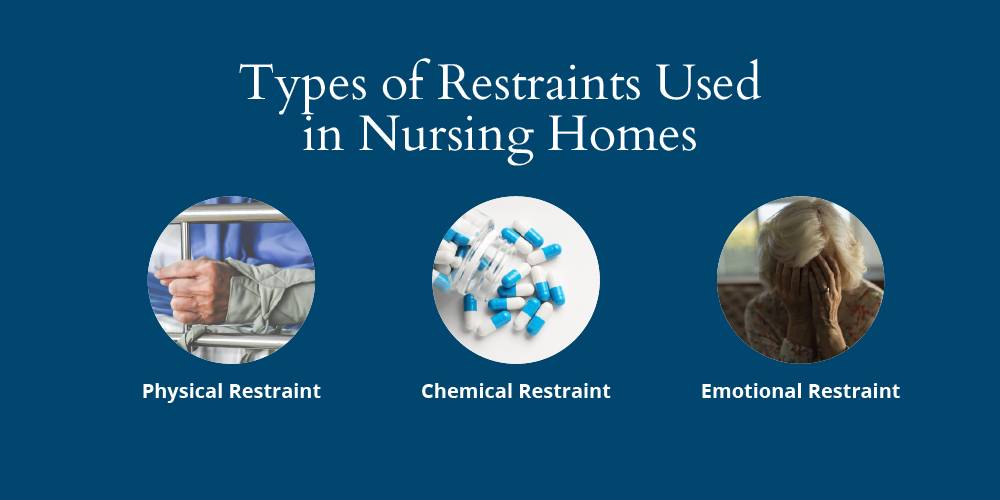Know the Signs of Improper Nursing Home Restraints
 Nursing homes are required to provide a certain standard of care for residents under both state and federal law. The law prohibits nursing homes from using unreasonable physical, chemical, or emotional restraint methods simply because it is more convenient than providing real supportive care.
Nursing homes are required to provide a certain standard of care for residents under both state and federal law. The law prohibits nursing homes from using unreasonable physical, chemical, or emotional restraint methods simply because it is more convenient than providing real supportive care.
Unfortunately, nursing homes are often understaffed and staff are often poorly trained or even abusive. It is essential to recognize signs of improper nursing home restraint methods so if your loved one is showing indications of improper restraint, you can take action right away.
At Schwartz Injury Law, we represent the rights of the elderly in cases of nursing home neglect and abuse. If your aging loved one has been subject to improper restraints in a nursing home, you deserve justice. When you work with us, our attorneys will thoroughly evaluate the conditions at your loved one’s nursing facility to identify signs of mistreatment.
Physical Restraints
Physical restraints may be the most common type of restraints because they are easy to use and readily available. Nursing home staff may restrain residents using legitimate restraint methods, such as ties, vests, or bedside rails, or makeshift restraints like belts, sheets, rope, or string. Physical restraints can cause serious injuries, including:
-
Severe bruising
-
Skin burns from wearing against the restraint
-
Patients getting stuck between their bed and a guardrail and suffocating
-
Strangulation
In more severe cases, the improper use of physical restraints can cause lasting damage. For instance, if a resident is handled roughly while being placed into restraints, he or she could suffer a spinal cord injury resulting in paralysis. At Schwartz Injury Law, our attorneys can access a patient’s medical records to look for physical evidence of improper physical restraints and cite it as evidence in a personal injury claim.
Chemical Restraints
Medicine that may be legitimately prescribed to a patient can be overused to sedate a patient who demonstrates behaviors that are inconvenient to staff. Tranquilizers, pain medications, sleep aids, anti-psychotic drugs, and anti-anxiety medications may all be used to sedate residents improperly. Signs of chemical restraints include:
-
Chronic sleepiness
-
Confusion
-
Inability to focus
-
Dizziness
-
Uncharacteristic lack of memory
The misuse of these medications can restrict oxygen to the brain, possibly resulting in brain damage. The improper administration of chemical restraints should be taken seriously, and at Schwartz Injury Law, we will fight to hold the facility accountable for any harm or distress inflicted upon your loved one.
Oftentimes, nursing homes will attempt to deflect responsibility for their actions by claiming the use of restraints was ‘reasonable.’ However, these justifications do not always line up with the facts. Our attorneys can look at security footage and speak to eyewitnesses to get an accurate account of what happened.
Emotional Restraint
Nursing home staff may also resort to yelling, threats, and intimidation to keep residents compliant. Signs that your loved one may be subjected to emotional restraint include:
-
Sudden and uncharacteristic fearfulness
-
Attempts to escape or requests to leave the facility
-
Fear of certain employees
-
Depression
-
Anxiety
-
Loss of will to live
All three types of restraint can result in muscle degeneration, decreased bone density, bedsores, incontinence, and increased infections. Besides the immediate health problems these symptoms present, a terrible loss of quality of life can occur, shortening a patient’s overall lifespan.
Every resident in a nursing home is entitled to dignity and respectful treatment. If you suspect that your loved one is being degraded, intimidated, or isolated in a nursing home, our attorneys can help you build a case against the facility. We will note any concerning symptoms, making sure that your loved one’s psychological distress does not go unaddressed in a claim.
Does Understaffing Result in Improper Restraints?
Understaffing is an epidemic across nursing homes in the United States. When nursing homes do not have enough employees to meet the needs of residents, safety protocols end up being neglected. Some facilities may overrely on sedatives if there are not enough staff to physically restrain a resident.
In other cases, a staff member could be forced to physically restrain a resident on his or her own, leading to fractures and bruises. Similarly, when the nursing home staff becomes overworked due to understaffing, they may take out their frustrations on the residents through emotional restraints.
At Schwartz Injury Law, our lawyers can investigate whether or not understaffing was a factor in the improper use of restraints. Even if the nursing home claims to have adequate staffing, we can look for discrepancies in their reported staff numbers to build a case for your loved one’s right to compensation.
The Impact of Poor Training
Even if a nursing home has enough staff to properly restrain residents, improperly trained employees can still cause serious harm. Nursing home staff need to exercise extreme caution when handling frail residents, as the slightest misstep could lead to a debilitating injury.
New hires at nursing homes are often required to go through an onboarding process to learn how to properly restrain residents. However, upper management at these facilities may skip this step to cover up an urgent staffing issue, leading to untrained staff injuring residents. Our attorneys can look for proof of improper training, getting testimony from any staff members or residents who are willing to give a statement.
Contact a Cook County, IL Nursing Home Injury Lawyer
Your loved one has rights under the law that protect them from negligence and abuse. But proving cases of negligence or abuse on the part of nursing home staff can be difficult and time-consuming. At Schwartz Injury Law, our experienced Chicago nursing home injury attorneys will do the heavy lifting and investigate the cause of your loved one’s injuries or death.
In past cases, we have secured millions of dollars for abused nursing home residents and their families. We have the resources and experience to take on personal injury claims involving improper restraints. To build a strong foundation for your case, we can consult with outside experts including nurses and physicians.
Our Chicago, IL nursing home abuse attorneys are here to represent your family’s best interests. Call us now at 312-535-4625 to schedule a no-obligation consultation over the phone or at one of our convenient office locations.

 312-535-4625
312-535-4625






